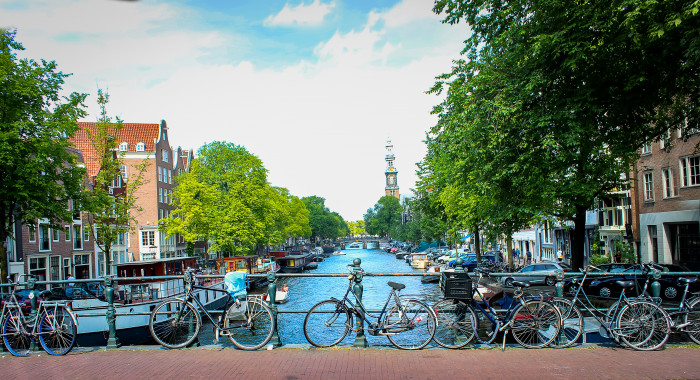
Cycling Cultures Around The World
Cycling is more than just a mode of transport; it's a lifestyle, a culture, and in many parts of the world, an integral part of daily life. From the flatlands of the Netherlands to the busy streets of Bogotá, here we take a look at the different and fascinating cycling cultures around the world.
Netherlands: The Biking Utopia
In the Netherlands, cycling is built into the fabric of society. With more bicycles than residents, the country boasts a huge and very well-maintained network of bike paths, making cycling safe, efficient, and fun! The Dutch use their bikes for everything from commuting to work, running errands, and even dropping kids off at school.
The key to the Netherlands' cycling success lies in its infrastructure. Dedicated bike lanes, bike-friendly traffic laws, and lots of bike parking facilities mean people of all ages feel it’s easy and safe to ride. In cities like Amsterdam and Utrecht, it's not uncommon to see entire families cycling together, often on specially designed cargo bikes known as bakfiets.
Denmark: Copenhagen's Cycling Revolution
Copenhagen in Denmark, is often ranked as one of the world's most bike-friendly cities. The Danish capital, like the Netherlands, has an extensive network of cycle tracks, bike bridges, and traffic signals specifically for cyclists. Nearly half of all trips to work or school in Copenhagen are made by bike, a true testament to how the city has successfully integrated cycling into daily life.
One of the standout features of Copenhagen's cycling culture is the Cycle Superhighways - yes, you read that right superhighways!. These are long-distance bike routes designed to make commuting by bike faster and more convenient. These highways connect the suburbs to the city center, encouraging even more people to choose cycling over driving. We love this idea!
Japan: The Organized Chaos of Urban Cycling
Japan's cycling culture is all about order and respect for the rules. In busy cities like Tokyo and Kyoto, cyclists navigate the streets alongside pedestrians and vehicles with such efficiency. The ubiquitous mamachari, a practical, sturdy bike often equipped with a basket and child seat, is the workhorse of Japanese urban cycling.
Cycling in Japan is facilitated by plenty of bike parking facilities, both above and underground, and the integration of cycling with public transport. Many train stations offer bike rental services, making it easy for commuters to combine cycling with train travel.
Colombia: Bogotá's Bold Ciclovía
Bogotá, Colombia, has pioneered one of the most innovative cycling initiatives in the world: the Ciclovía. Every Sunday and public holiday, the city closes over 75 miles of streets to motor vehicles, opening them up for cyclists, pedestrians, and skaters. This weekly event attracts millions of participants and has inspired similar programmes in cities around the world.
The success of the Ciclovía has led to further investment in the cycling infrastructure in Bogotá, including the construction of dedicated bike lanes and bike-sharing programs - all part of a broader strategy to reduce traffic congestion, improve air quality, and promote healthy living.
India: The Rise of Urban Cycling
In India, cycling is experiencing a resurgence, particularly in urban areas like Bangalore, Pune, and New Delhi. While challenges such as traffic congestion and limited infrastructure persist, a growing number of initiatives are being championed to make cycling safer and more appealing.
Cities like Bangalore are developing dedicated cycling lanes and organizing events like "Cycle Day" to raise awareness and encourage more people to take up cycling. In Pune, the "Cycle for Change" initiative is transforming the city's cycling infrastructure and promoting cycling as a sustainable mode of transportation.
USA: Diverse Cycling Scenes
In the US, the cycling culture varies widely from coast to coast. Cities like Portland, Oregon, and Minneapolis, Minnesota, are known for their great cycling infrastructure and active cycling communities. Bike lanes, bike share programs, and cycling events like "Bike to Work Day" promote cycling as a healthy and sustainable means of transport.
Portland, in particular, has earned a reputation as a cycling haven, with its extensive network of bike paths, bike-friendly policies, and a strong community of cyclists. The city's commitment to cycling is evident in initiatives like the "Green Loop," a planned 6-mile linear park that will connect neighbourhoods and provide a safe, car-free route for cyclists and pedestrians.
South Africa: Cape Town's Scenic Routes
Cape Town, South Africa, offers some of the most scenic cycling routes in the world, from coastal paths with stunning ocean views to challenging mountain trails. The city's commitment to promoting cycling is shown in its extensive network of bike lanes and bike-friendly policies.
The Cape Town Cycle Tour, the world's largest timed cycle race, attracts over 35,000 cyclists each year, showcasing the city's vibrant cycling culture. Beyond the race, Cape Town's residents and visitors enjoy a variety of cycling events and community rides that celebrate all things biking!
So whether it's the seamless integration of bikes into daily life in the Netherlands and Denmark, the orderly urban cycling in Japan or the bold initiatives in Colombia and India, what is clear is that more and more cities are recognising the benefits of cycling and what it can do for our health, our cities and the environment. And we say big cheers to that!
